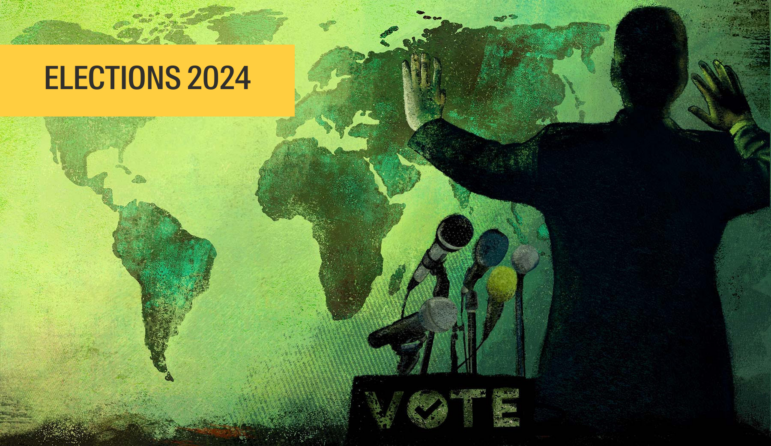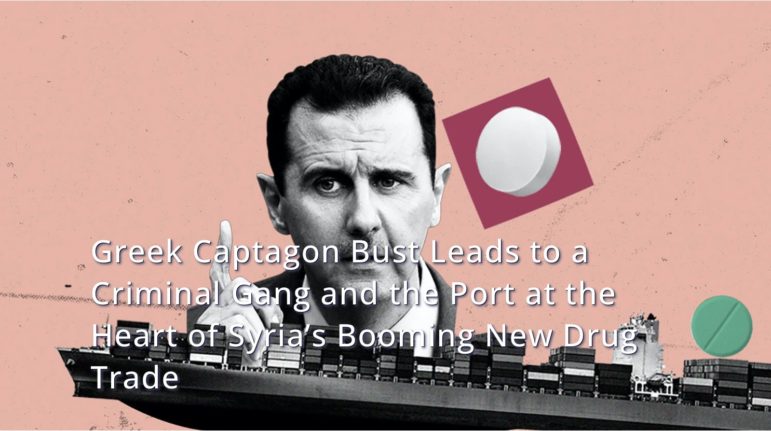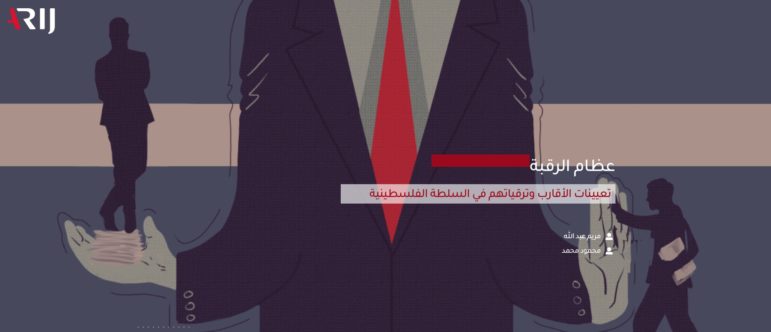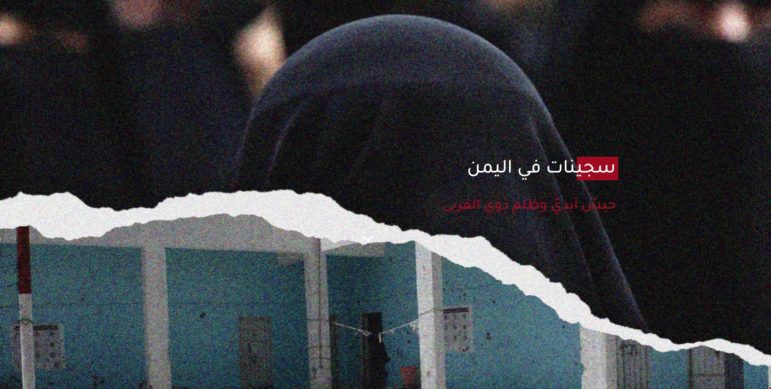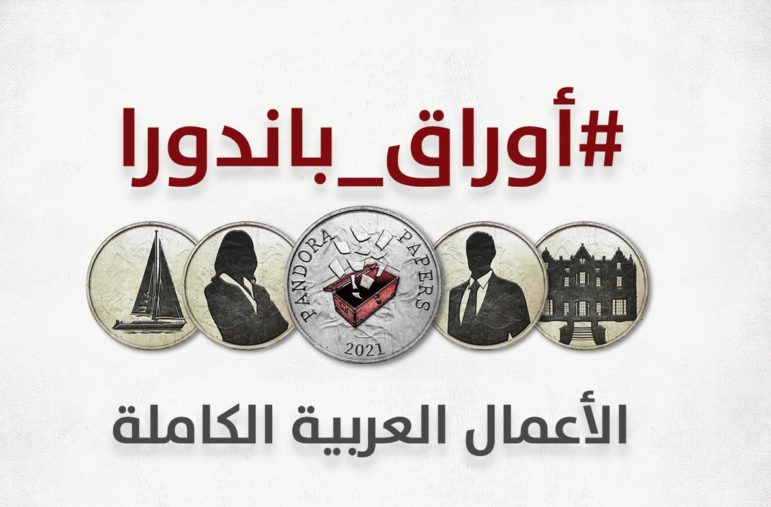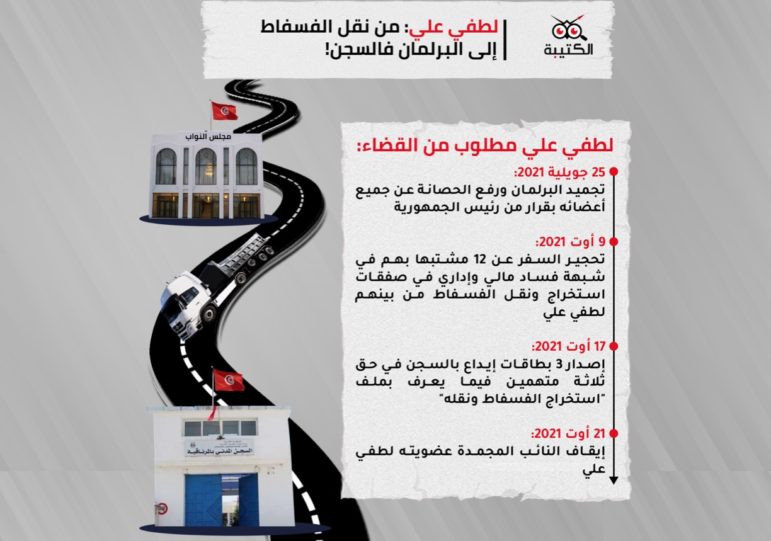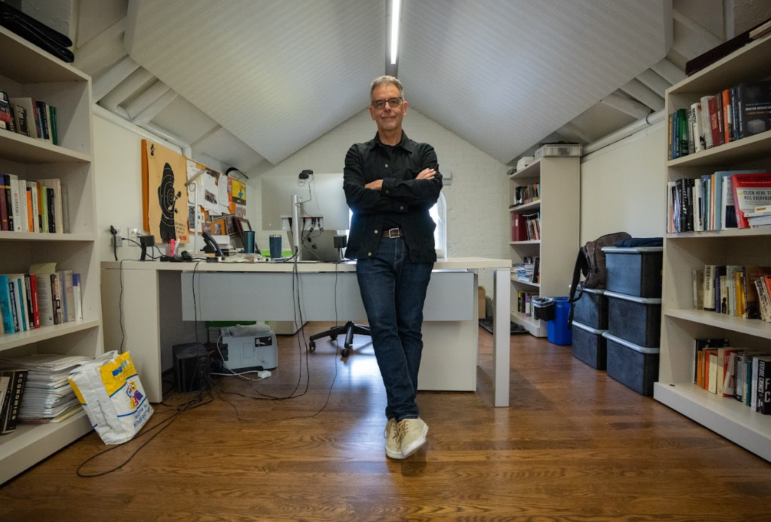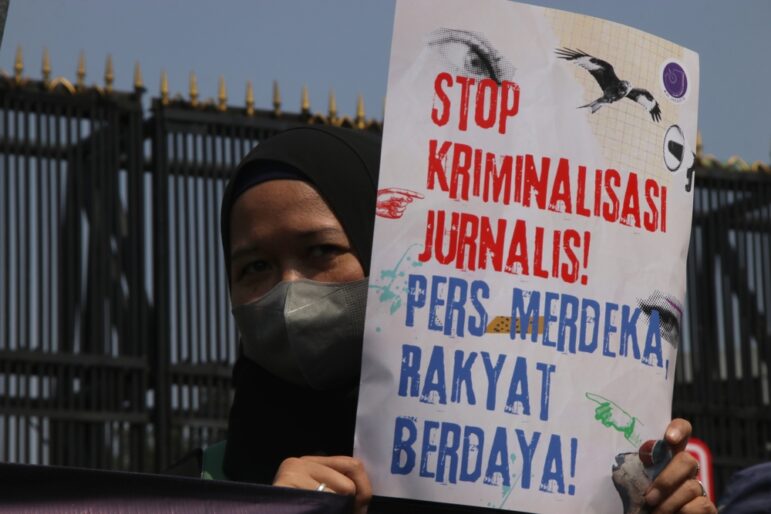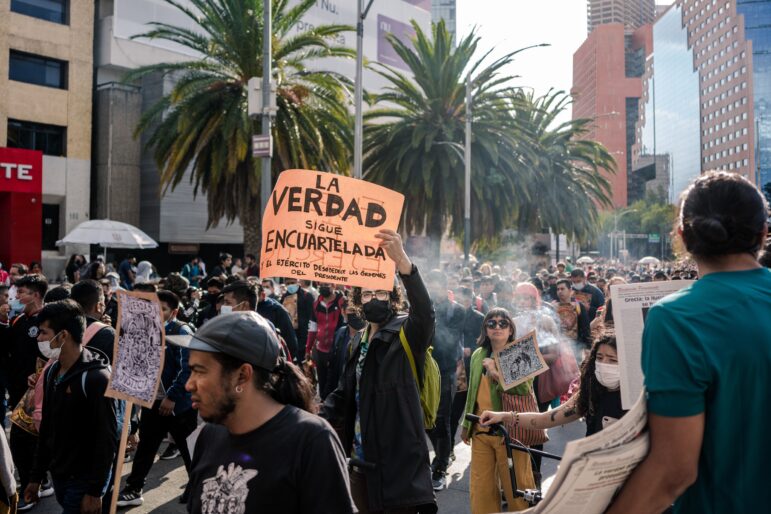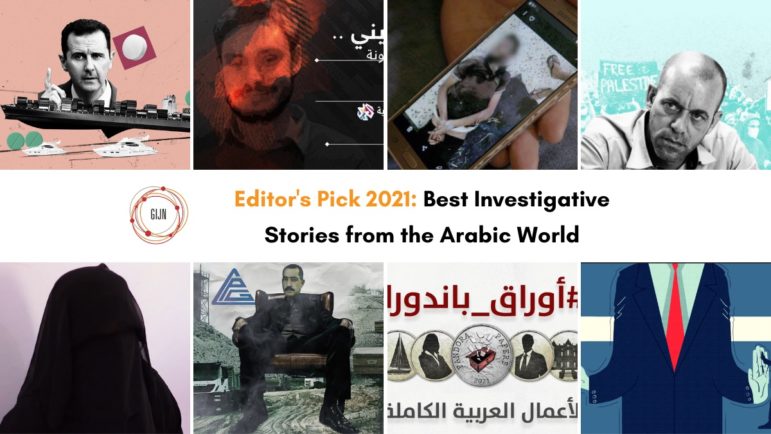

Editor’s Pick: 2021’s Best Investigative Stories from the Arab World
Read this article in
Get a group of watchdog reporters from Arabic-speaking world into a (virtual) room, and they tend to agree on one thing: the enormous challenges that inhibit and weaken investigative journalism in the region. From heavy surveillance and censorship to the lack of financial and editorial resources, 40 reporters at the 12th Global Investigative Journalism Conference shared stories of structural and policy issues that make investigative reporting difficult across the Middle East and North Africa.
Countries such as Saudi Arabia, Egypt, Syria, and Iraq are still among the most dangerous places for reporters anywhere in the world, according to the Reporters Without Borders 2021 Press Freedom Index. The report documents how these countries have intensified the use of repressive practices to control the media, and how violations against independent journalism remain rampant. Sherif Mansour, the Middle East and North Africa coordinator at the Committee to Protect Journalists, said governments in the region have increased their surveillance, hacking, and criminalization of journalism, while recent arrests have been aimed at silencing outspoken members of the press.
These conditions inevitably impact journalistic freedom and affect the work of investigative reporters, but still there are success stories. In December 2021, three investigative outlets based in the Arab region joined GIJN, bringing the number of organizations from the region in our network to six. And throughout 2021, reporters produced excellent investigative work, some as part of transnational reporting collaborations on human rights, financial investigations, and phone hacking. With a salute to our colleagues who work in this very tough neighborhood, we are proud to highlight some of their best from the past year. – Majdolin Hasan and Chafiq Sroor, GIJN Arabic
The Unsolved Murder of Giulio Regeni (Egypt / UK)
Five years have passed since the murder of Italian researcher Giulio Regeni in Egypt, yet details from the case keep emerging. The latest development came to light via the Sheefra (Cipher) program broadcast by Alaraby, a pan-Arab satellite TV network based in London, which aired two exclusive witness testimonials stating that Regeni was detained, interrogated, and tortured in the Egyptian military intelligence headquarters in January 2016. The report – based on testimony from people with him in the prison – also revealed details of a joint Italian-Egyptian investigation, including details from an Italian indictment that named a number of Egyptian security officers linked to the case. The report reconstructs Regeni’s last nine days and documents the level of involvement of the police and the intelligence services from the moment Regeni was arrested until his death. The latest legal case against those accused of killing the student was suspended in October. Egypt’s security forces have denied being involved in Regeni’s death.
Pegasus Project: Phone Hacking in the Region
The Pegasus scandal, based on a massive trove of documents obtained by the nonprofit Forbidden Stories, revealed how the mobile phones of 50,000 people, including politicians, activists, opposition figures, journalists, and others, had been hacked by governments accused of using Pegasus spyware produced by the Israeli company NSO.
Reporters for Daraj, a Lebanese website, were among the team of 80 journalists invited to interrogate the data, with technical support from the Amnesty International Security Lab. Daraj, an independent digital platform committed to telling investigative stories, reported how NSO allegedly provided the governments of Morocco, Saudi Arabia, and the United Arab Emirates with its spying technology. Ostensibly, the reason given for acquiring this technology was to track down and combat terrorism.
In a series of exposés, reporters analyzed the content within this document stash through first verifying hundreds of telephone numbers. Dozens of phones were also forensically analyzed to verify whether they had been hacked.
Greek Captagon Bust Leads to the Heart of Syria’s Booming Drug Trade (Syria)
The Organized Crime and Corruption Reporting Project (OCCRP), in collaboration with the Investigative Reporting Project Italy (IRPI Media), exposed details of a Syrian crime network and front companies allegedly involved in trafficking of amphetamine-like captagon in the Mediterranean. The report was prepared by examining Greek, Italian, and Libyan court records as well as the companies’ registration and shipment tracking data, as well as interviews with officials and crime experts.
The investigation traced the trafficking to Latakia, a port under the control of the Syrian regime. Here, journalists discovered that the owner of a cargo ship caught carrying captagon and cannabis worth $100 million was a Syrian national tied to a cousin of Syrian President Bashar Al-Assad.
‘Neck Bones’: Nepotism in Palestine (Palestinian Territories)
This in-depth investigative report by Arab Reporters for Investigative Journalism (ARIJ), an Amman-based investigative reporting network, questioned the fairness of employment practices in the Palestinian territories by showing how elite political families hire their own relatives for government positions.
The report documents how 71 relatives of Palestinian officials were appointed to high-ranking administrative and diplomatic posts in the last 10 years: 23 in the diplomatic corps and 48 in other government positions. Journalists were able to prove this by reviewing state appointment records, examining local news archives, and reviewing job ads by the Civil Service Bureau. When national outrage followed the appointment of a nephew of the minister for women in 2020, the minister defended her choice, saying it was her right to choose a candidate from the “bones of the neck, from my family, at least.” That unusual quote led to the hashtag #neckbones trending on social media, and its use as the title for this investigation.
Unjust Imprisonment of Women (Yemen)
Yusra, a 21-year-old Yemeni woman, became pregnant as a result of a sexual assault. Her father tried to kill her after he learned about her pregnancy, and since she had previously been married, Yusra was herself accused of adultery and sentenced to prison in the capital city of Sana’a. Her rapist, however, escaped punishment.
Yusra is one of dozens of young women whose stories were documented in this investigative report, which was sponsored by ARIJ and published in collaboration with Daraj, Open Democracy, and online news site Khuyut.
According to imprisoned women’s testimonials, court records, and interviews with lawyers and workers in civil society organizations, women in Yemen are often falsely accused and convicted of crimes. After spending time in prison, many are then ostracized from their families, so even when they complete their sentences, they are unable to find a place to stay and end up serving extended time in prison.
Arbitrary imprisonment is not limited to women; it also includes children and minors, among them an imprisoned women featured in this story with two daughters who stayed with her in prison for eight years.
Pandora Papers
The Pandora Papers leak, coordinated by the International Consortium of Investigative Journalists (ICIJ), saw more than 600 journalists worldwide collaborate to investigate the offshore secrets of wealthy elites from more than 200 countries and territories, in one of the largest journalistic collaborations in history.
Several organizations from the Arab region contributed to this transnational effort. In Tunisia, the independent nonprofit Inkyfada allocated a special part of its website to reports tracing the wealth of powerful Tunisian officials. ARIJ produced reports in several countries, including exposés on the influence of businessmen supported by governments in Mauritania, Sudan, and Yemen.
This project involved more regional partners than any of the ICIJ’s previous large-scale investigative projects, with news sites like Daraj, BBC Arabic, and the La Desk website from Morocco also taking part in the project. Most governments in the region ignored the stories after they were published and denied comment. Others tried to censor the findings, as in Jordan, where the country’s intelligence service blocked reporting on King Abdullah II’s expansive and secretive property empire.
A Forest of Corruption (Tunisia)
Tunisia’s lucrative phosphate industry has been exploited, allowing some to make massive financial gains at the expense of the Tunisian people. That’s according to this investigation, which digs into the industry and the role of a powerful businessman-politician who became the defendant in a case that has sent shockwaves through the country. Alqatiba, an online news magazine, obtained a set of confidential documents that illuminate the insider deals affecting the transport and delivery of phosphate, a mineral used in agriculture worldwide, and what happened to the critically important industry in the wake of the Tunisian revolution. The company mentioned in this investigation declined to comment on the claims made in the piece, citing the ongoing judicial investigation. Lawyers for the businessman-politician, who is accused of exploiting his influence for financial gain, also did not respond to the Alqatiba reporter’s requests for comment.
Russian Mercenaries: Inside the Wagner Group (Libya)
The scale of operations by a shadowy Russian mercenary group in Libya’s civil war, the Wagner Group, was revealed in an investigation by BBC Arabic. Although this private military group is notoriously secretive, the BBC was able to speak with two of its former military contractors. The exposé revealed the types of people joining Wagner and the company’s lack of a code of conduct with regard to the treatment of civilians or prisoners of war.
The Russian government denies any links to Wagner. But a purported Wagner “shopping list” of material found on an electronic tablet and leaked to the BBC by a Libyan intelligence source included a state-of-the-art radar system and four tanks, weaponry that one military analyst said would only be accessible if the Russian military were involved.
Additional Resources
Reporting on Migration in the Gulf: A Revised and Expanded GIJN Guide
Investigating What Assad’s Regime Did with Money to Rebuild Syria
Editor’s Pick: 2020’s Best Investigative Stories from the Arab World
 Majdolin Hasan, GIJN’s Arabic editor, is an award-winning journalist who has worked with Global Integrity, 100Reporters, and Arab Reporters for Investigative Journalism. She was the director of an investigative journalism unit in Jordan and was the first Jordanian to file a case against the Jordanian government for denying her right to public information.
Majdolin Hasan, GIJN’s Arabic editor, is an award-winning journalist who has worked with Global Integrity, 100Reporters, and Arab Reporters for Investigative Journalism. She was the director of an investigative journalism unit in Jordan and was the first Jordanian to file a case against the Jordanian government for denying her right to public information.
Chafiq Sroor, GIJN’s Associate Arabic editor, has 10 years of experience in visual storytelling and social media marketing.


